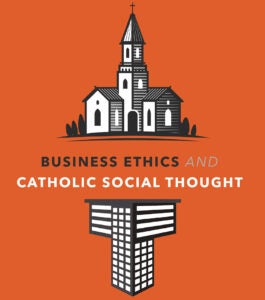
Business Ethics and Catholic Social Thought
 Something is happening within U.S. capitalism.
Something is happening within U.S. capitalism.
Half a century ago, the economist Milton Friedman – one of my professors in graduate school – declared in Time magazine that the only purpose of business is to make a profit. And for decades the dominant perspective in American business seemed to be moving in that direction. As big firms bought up smaller ones, service and philanthropy to local communities diminished, and employees worked at ever greater psychic distance from the corporate boards that decided their fate.
But things are changing. Blackrock – the world’s biggest investor, with more than $6 trillion under investment – shocked Wall Street in January 2019 when it informed all its firms that “society is demanding that companies, both public and private, serve a social purpose.” The letter to CEOs added that if a company doesn’t engage with the community and have a sense of purpose, “it will ultimately lose the license to operate from key stakeholders.”
Similarly, later that year, the Board of the Business Roundtable (on which sits a Who’s Who of American CEOs) declared that they share a fundamental commitment to all of their stakeholders. They committed to delivering value to customers, investing in employees, dealing fairly and ethically with suppliers, and supporting the communities in which they work, in addition to generating long-term value for their shareholders.
The 2021 book, Business Ethics and Catholic Social Thought (Georgetown University Press), arose out of research by the True Wealth of Nations project at the Institute for Advanced Catholic Studies at USC. The book does not attempt to explain why these shifts are occurring. Instead, it asks what Catholic social thought has to say about responsible business – providing as a byproduct a religious rationale for ethical change in American business.
Business Ethics and Catholic Social Thought asks what Catholic social thought has to say about responsible business – providing as a byproduct a religious rationale for ethical change in American business.”
The project began with this question: Can a religion whose founder taught love of neighbor as the most fundamental moral principle give moral approval to profit-seeking business firms in a global economy?
Eighteen months ahead of time, our steering committee met with a core group of others to specify the topics needing attention and to identify the best scholars to take them on. Papers were written and read by all participants before the conference, so precious time together would be spent only in discussing and debating the issues, not listening to papers being read (the major weakness of 99% of scholarly conferences). Authors edited their work in light of conference conversations, working hard to make connections among the chapters so the resulting book has an integrity that most “conference volumes” lack.
Can a religion whose founder taught love of neighbor as the most fundamental moral principle give moral approval to profit-seeking business firms in a global economy?”
Most work in business ethics addresses an array of issues and approaches, focusing largely on improving the decisions of managers at all levels within the firm. That’s good, but this project asks a larger question: what is the moral assessment of business as a whole in Catholic social thought?
Part I includes the first two chapters, which include Regina Wolfe’s interviews of three CEOs striving to lead responsibly and Jennifer Herdt’s history of the moral analysis of business from medieval to contemporary times.
Part II examines three fundamental issues. Andrew Yuengert critiques the over-emphasis on management science in business schools, when actual business owners more frequently need to rely on practical reason (what used to be called “prudence”). Gregory Beabout proposes an adequate understanding of autonomy and agency (the capacity to make decisions). Mary Hirschfeld reviews the contributions of Pope Francis, particularly his critique of “the technocratic paradigm,” and suggests a “creation paradigm” instead.
Part III addresses the wider responsibilities of business in five chapters. Kenneth Goodpaster and Michael Naughton argue that the purpose of business institutions should be shaped by an “institutional insight” informed by the common good. David Cloutier describes “good goods” and how businesses could produce more of them. Martin Schlag argues that businesses have a responsibility to help ensure that the common good is part of the goal of both the market and other institutions of society. Edward Kleinbard reminds us of how much personal prosperity arises from luck and argues for better social “insurance” for the less fortunate. Martijn Cremers argues that because markets never achieve the “perfect competition” described in Econ 101, we have work to do to provide at least a rough equality in access to information, power, and control among market participants.
The insights of this work, available in the book, have been crafted to help business school faculty and their students, but it will open new ways to think for business leaders and citizens everywhere. Two of the fundamental goals of the Institute are to challenge and inform contemporary conversations with the insights of the Catholic intellectual tradition. This volume promises to do just that for a view of good business today.
Editor’s Note: Dan Finn, Ph.D., is a professor of Theology and Clemens Professor of Economics at St. John’s University and the College of St. Benedict. He is a former president of the Catholic Theological Society of America, the Association for Social Economics, and the Society of Christian Ethics. His books include Consumer Ethics in a Global Economy: How Buying Here Causes Injustice There, Christian Economic Ethics: History and Implications, and The Moral Ecology of Markets: A Framework for Assessing Justice in Economic Life. He is an IACS trustee and the director of the True Wealth of Nations research project. He edited Business Ethics and Catholic Social Thought, now available through Georgetown University Press.